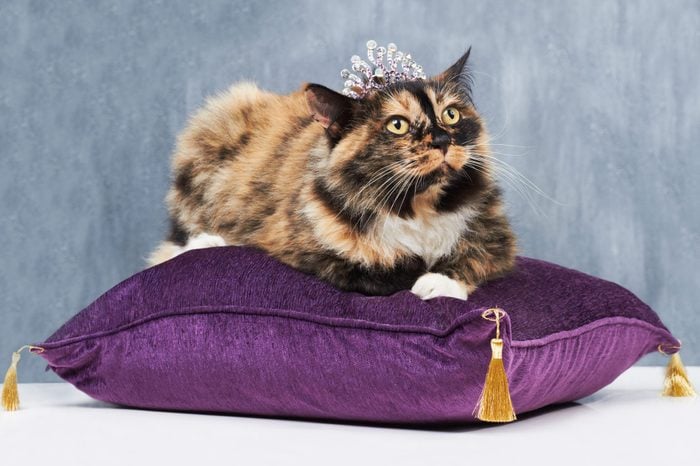
The expensive cats you want when money doesn’t matter
Owning a cat naturally comes with expenses—grooming, cat food, toys, vet bills. However, some of the cutest cat breeds are just more pricey than others, for a number of reasons. Some of the most expensive cat breeds are large cat breeds and others are sweet, adoring and affectionate cat breeds, coveted by many.
“Some cat lovers prefer to spend the big bucks on a purebred cat because they’re attracted to the physical characteristics of a cat, like the beauty of the cat’s coat or unique fur pattern,” says Charlotte Reed, former cat show handler and pet-talk host of The Pet Buzz radio show and podcast.
Without further ado, here’s our countdown list of the most expensive cat breeds, along with their average cost and fascinating intel on the breed’s cat behavior and characteristics. Get ready to be meowed.
Get Reader’s Digest’s Read Up newsletter for more pets, humor, travel, tech and fun facts all week long.
.
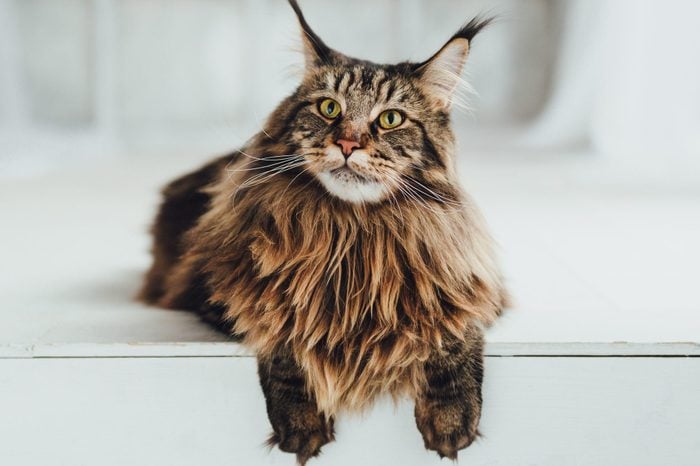
12. Maine Coon
Average cost: $1,000–$2,000
Maine Coons have been on the Cat Fanciers’ Association’s top breed list for years, hence the loftier price tag. As one of the friendliest cat breeds, the Maine Coon is widely considered the gentle giant of the cat world. They’re especially good around kids and other family pets. You would be hard-pressed to see any signs this cat is mad at you.
These sturdy kitties are built to withstand the snowy winters of New England. “They have larger paws to function as snow shoes to walk in the snow during those cold Maine winters,” says Nicole Savageau, a veterinarian with The Vets. They also have long whiskers, and many are born with extra toes, which help them navigate the great outdoors even better.
Though they are a hardy breed, they are prone to specific genetic diseases. “The one we tend to worry about the most is Hypertrophic Cardiomyopathy (HCM).” Pet parents should get a yearly ultrasound to monitor and stay on top of this heart condition.
| Breed overview | Maine Coon |
| Height | 10–16 inches |
| Weight | 10–25 pounds |
| Life expectancy | 9–15 years |
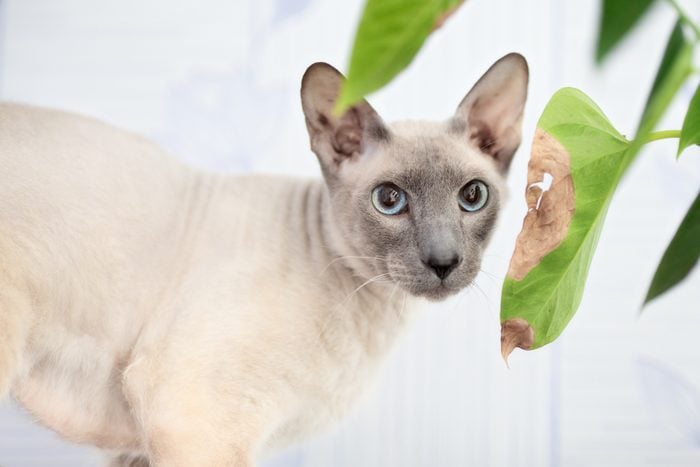
11. Peterbald
Average cost: $1,000–$2,600
This exotic and small cat breed has only been around since 1993. It was created by a Russian breeder who crossed a hairless cat breed called the Donskoy and an Oriental Shorthair. Often, the newer cats on the block are the most expensive cat breeds. That’s because it is costly for a cattery to breed a new and unique variety. A healthy top-notch stud and queen are expensive, and some breeders must import the breed.
“Fuzzy or bald, these naked charmers are the ideal cuddling companion, especially during winter, thanks to their higher-than-average body temperature,” says Paola Cuevas, a veterinarian at PetKeen. They are also very chatty. “Peterbalds will narrate endless stories to you or any other family member available.”
| Breed overview | Peterbald |
| Height | 8–12 inches |
| Weight | 6–12 pounds |
| Life expectancy | 10–13 years |
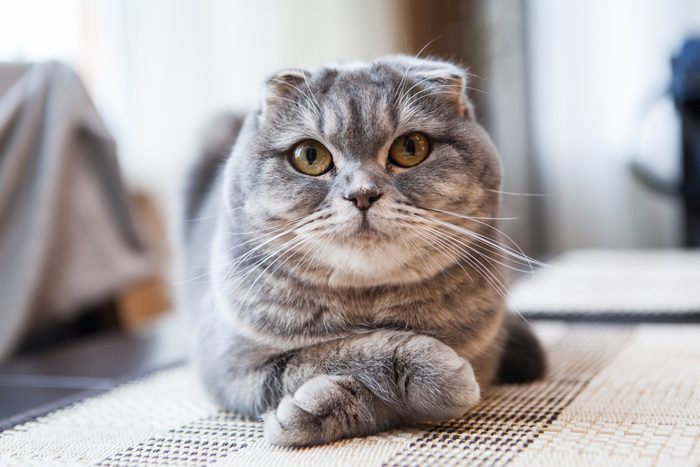
10. Scottish Fold
Average cost: $1,500–$2,500
If you’re looking for a cute, fluffy and snuggly cat breed whose one true love is you, the Scottish Fold wants your number. “Resembling an owl with its large eyes, rounded head and folded ears, this charming breed is intelligent, soft-spoken and easily adaptable to new situations,” says Reed. Their folded ears are their defining feature—and why they are one of the most expensive cat breeds. Taylor Swift has two of her own, often featured on her social media.
The folded ears are due to osteochondrodysplasia, a condition that causes a cartilage abnormality. It can cause pain in other body parts as the cat ages too. “Osteochondrodysplasia might result in the fusing of joints in the ankles, knee or tail. This will severely affect their mobility, making them stiff and very uncomfortable. In some cases, it can develop into severe arthritis,” says Dr. Cuevas.
| Breed overview | Scottish Fold |
| Height | 8–10 inches |
| Weight | 9–13 pounds |
| Life expectancy | 11–14 years |
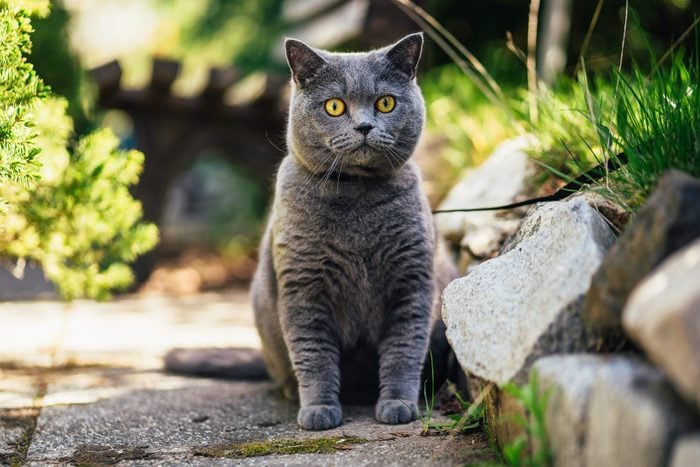
9. British Shorthair
Average cost: $1,500–$3,000
Just one look, and you can see why these super cute and wildly popular Brits made this list, but if you need to justify the cost, we’ve got you covered. For starters, British Shorthairs are known for their clean bill of health—though they are prone to obesity if they get their paws in the treat jar too often.
Fewer vet visits are a plus when you’re laying down a large sum of cash to buy a pet. British Shorthairs can come in a variety of colors, but it’s the smokey blue with copper-colored eyes that are the most coveted. But they’re not lap cats. “They are happy to sit by your side for cuddles. They will purr as long as you do not attempt to pick them up,” says Dr. Cuevas.
These kitties have such a mischievous smile, it inspired illustrator John Tenniel’s rendition of the Cheshire Cat from Alice in Wonderland.
| Breed overview | British Shorthair |
| Height | 12–14 inches |
| Weight | 7–17 pounds |
| Life expectancy | 15–20 years |
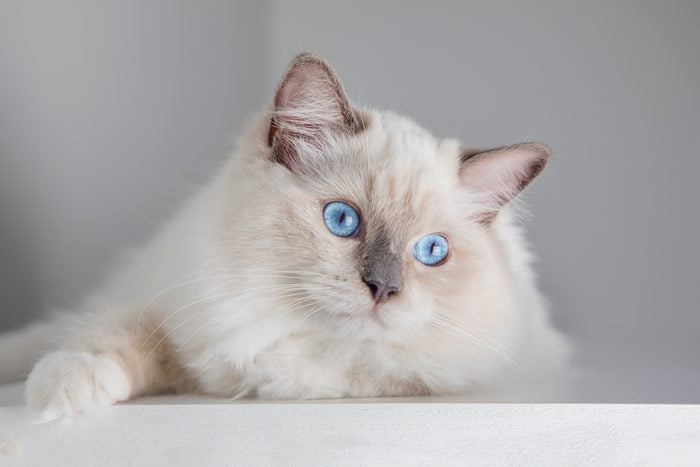
8. Ragdoll
Average cost: $1,500–$3,000
Big and ultra-fluffy with piercing blue eyes, it’s no shocker Ragdolls are so popular and thus command a higher price tag. But they are more than a pretty face. “These calm, easygoing and sweet-natured cats are exceptionally social, making them a good fit for bustling homes with plenty of people, visiting guests and friendly pets,” says Reed. They are a cat breed that gets along with dogs, so there shouldn’t be too much hissing and clawing between roomies.
You can’t put a price on the undying devotion the Ragdoll has for its humans. While some cats are standoffish, these lovable furballs are happiest with you, following you around, rubbing up against you, sleeping with you and greeting you at the door. In return for their devotion, keep an eye on their health, as they are prone to weight issues and urinary and heart problems, Reed says.
| Breed overview | Ragdoll |
| Height | 9–11 inches |
| Weight | 8–20 pounds |
| Life expectancy | 12–15 years |
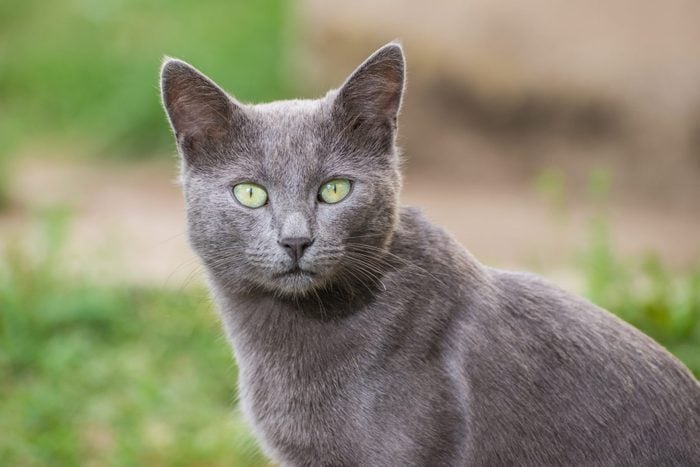
7. Russian Blue
Average cost: $1,500–$3,000
Sometimes the most expensive cat breeds want to know your worth. “They study every newcomer’s intention from a safe distance,” says Dr. Cuevas. “It’s up to them to decide the relationship’s terms.” But once they know you’re a kitty kindred spirit, they’ll be your biggest fan.
Although they are called “blue” by cat fanciers, they come in various shades of light bluish gray, from silver to a deep slate. Russian Blues are popular and pricier for their beauty but also because they’re exceptionally clean and orderly, and they’re particularly fastidious about their litter box. You may want to consider a self-cleaning litter box because they may find a more hygienic place to do their business if you don’t keep it clean.
| Breed overview | Russian Blue |
| Height | 8–10 inches |
| Weight | 8–15 pounds |
| Life expectancy | 15–20 years |
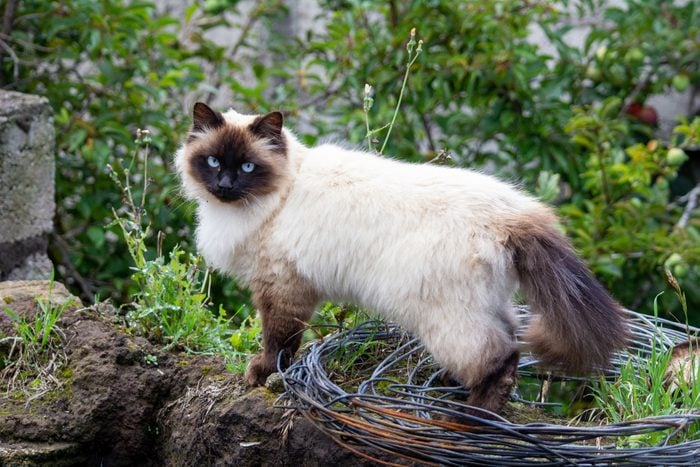
6. Himalayan
Average cost: $2,800–$3,500
What do you get when you cross a gorgeous Persian with a striking Siamese? A super adorable Himalayan! This hybrid breed was created in the 1930s to achieve the Persian’s long hair and the color points of the Siamese. You might be wondering if the Himalayan picked up the loud vocal genes of the Siamese. It didn’t.
Himalayans are the perfect combo of gentle temperament and a luxurious coat. “They are sweet-natured, loving cats who are extremely attached to their owners. They would prefer a loving petting session to a vigorous play session,” says Reed.
While you don’t have to be concerned with meeting high exercise expectations, be prepared to do a lot of heavy lifting in the grooming department. Daily grooming is a must, as is a monthly bath. So you’ll want to hone your cat-bathing skills to keep the oils and dirt from building up in their fur.
| Breed overview | Himalayan |
| Height | 10–12 inches |
| Weight | 7–12 pounds |
| Life expectancy | 9–15 years |
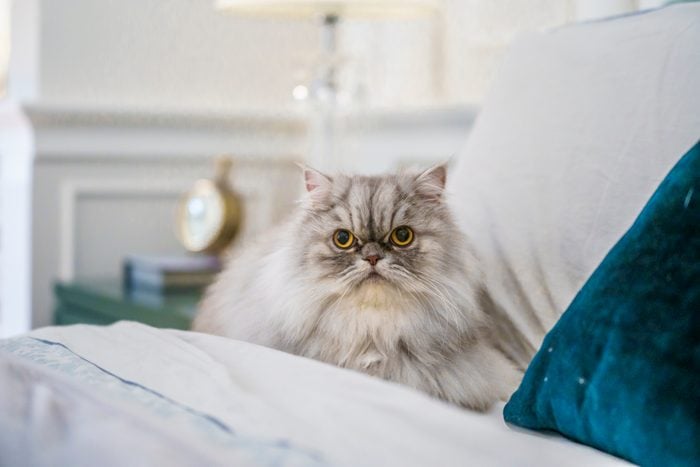
5. Persian
Average cost: $1,300–$5,000
As one of the oldest cat breeds, believed to be from Persia (now Iran), glamorous Persians are just as popular today as they were when they graced Queen Victoria’s lap. “With its distinct flat face and beautiful long hair, the Persian prefers a calming and quiet lifestyle. But, it can fool you with a sudden burst of energy,” says Reed. Other than the occasional cat zoomies, you probably won’t witness a Persian doing much that’s not dignified.
Persians generally prefer to live with adults in a quiet household. Some cats aren’t fond of being picked up, but the Persian relishes a snuggle session. And about that luxurious coat—it ends up everywhere, but a good vacuum for pet hair will give you a big assist. Note also that Persians are prone to cherry eye, which causes the eyelashes to grow inward. And because of that cute flat face, they may have respiratory issues.
| Breed overview | Persian |
| Height | 8–10 inches |
| Weight | 7–12 pounds |
| Life expectancy | 10–18 years |
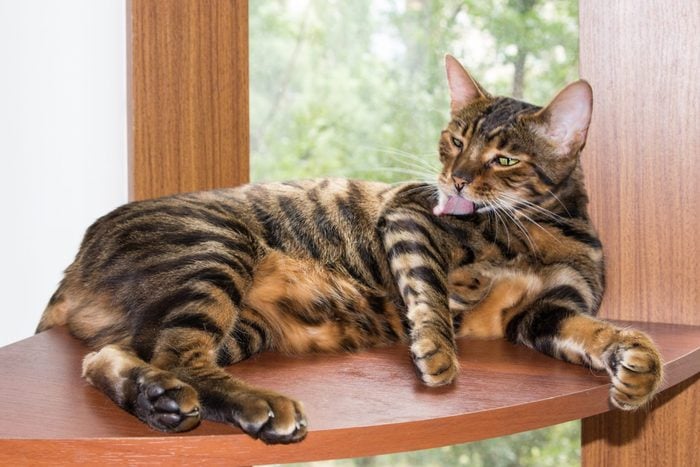
4. Toyger
Average cost: $1,500–$6,000
For cat parents who want their own frisky mini-tiger to play with, the Toyger could be the purr-fect match. But there’s no wild blood in a Toyger: Their genes are a mix of Bengal and a striped domestic shorthair. “If you ever dreamed about being able to train a feline, the Toyger has the disposition, intelligence and perfect wildcat looks,” says Dr. Cuevas. Learning new tricks, solving interactive kitty puzzles and playing with cat toys aren’t just fun but essential mental stimulation for this smarty cat.
Just because they have a wild tiger vibe going for them, it doesn’t mean they don’t enjoy cuddling and affection. But they might not tolerate a child’s overly enthusiastic cuddles, so a home with kids (and adults) who respect the Toyger’s personal boundaries is best.
| Breed overview | Toyger |
| Height | 9–13 inches |
| Weight | 10–15 pounds |
| Life expectancy | 10–15 years |
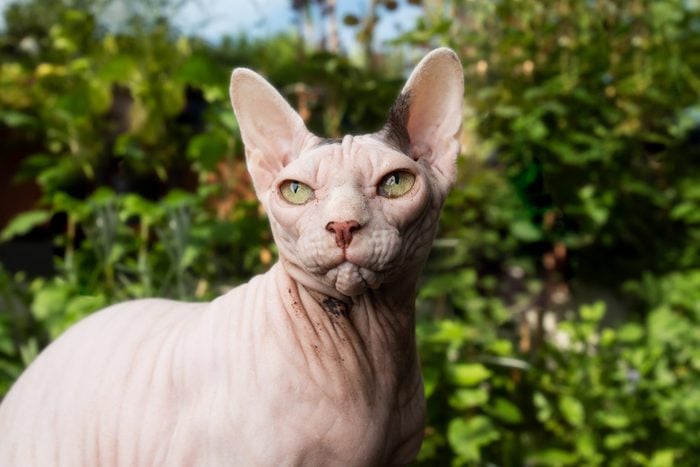
3. Sphynx
Average cost: $3,500–$6,000
The Sphynx looks like it belongs in an ancient Egyptian tomb, but this breed hails from Toronto, Canada. This new cat breed was born when a domestic cat gave birth to a hairless kitten, courtesy of natural genetic mutation. “These hairless and wrinkled cats are playful with other cats, kids and dogs, making them an excellent choice for families,” says Reed.
It can get a little chilly for these furless extroverts, so cuddling and sleeping under the covers is the norm. “Hairless cats will also need sunblock to protect them from sunburns while lounging by a window or when outside,” says Dr. Cuevas.
Being hairless means no brushing or shedding, but cat parents need to take special care of their Sphynx’s skin by bathing them frequently. Because of a recessive gene, not all kittens in a litter will be born hairless, which makes the furless kitties all the more rare.
| Breed overview | Sphynx |
| Height | 8–10 inches |
| Weight | 9–13 pounds |
| Life expectancy | 11–14 years |
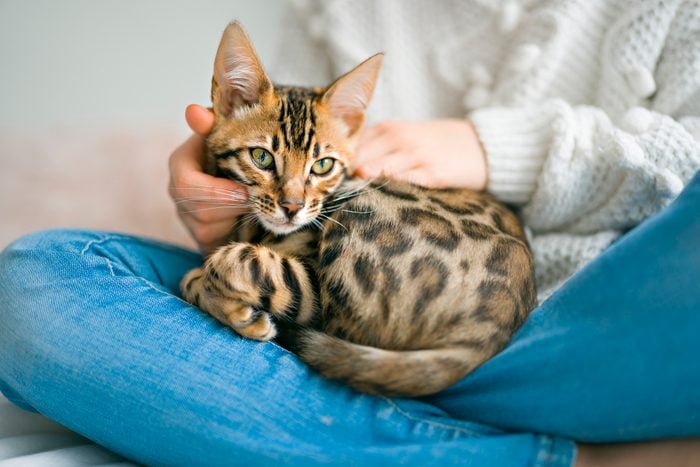
2. Bengal
Average cost: $4,000–$10,000
Is one of the most expensive cat breeds masquerading as a baby leopard? It sure looks like it. Bengals are the only domestic cat breed that can have distinctive rosettes like the markings on leopards, jaguars and ocelots. How did this stunning feline come to be? In the mid 1960s, a domestic cat was bred with a cat species called the Asian Leopard cat.
“The Bengal is a sleek, intelligent and demanding athlete that must be able to run, jump, climb, romp and play to be content,” says Reed. “This active cat is not a good choice for first-time feline owners with limited time.” Bengals aren’t lap sitters or lazy loungers, at least not until after they’ve tired out. If you need a little break from their energy, a pet water fountain can provide entertainment—while most cats hate water, Bengals love playing in it.
| Breed overview | Bengal |
| Height | 8–10 inches |
| Weight | 8–15 pounds |
| Life expectancy | 9–15 years |
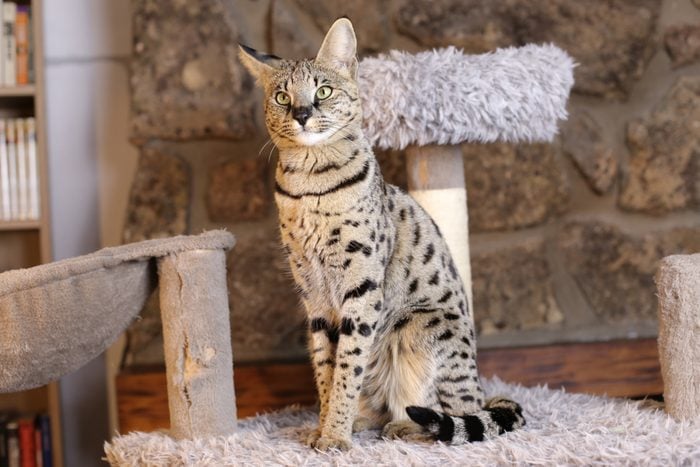
1. Savannah
Average cost: $6,000–$20,000
And the winner goes to: the elegant Savannah. It came into being in 1986 by way of wild African cats called Servals and domestic cat breeds such as Bengals, Egyptian Maus and Oriental Shorthairs. They’re good family companions and fiercely loyal. They can share space with dogs and other cats, but since they’re natural-born hunters, don’t make the mistake of trying to forge a relationship between a Savannah and small critters such as hamsters, fish and birds.
Savannahs are athletes that are curious, playful and adventurous. In fact, they can leap up to eight feet! “Save some cash, or get creative, to provide vertical spaces, as this breed needs them,” says Dr. Cuevas. Outdoor excursions, including walking on a leash or a dip in the water, are recreational possibilities too. The price range varies widely because first-generation cats (a Savannah with a serval mother or father) are the most expensive, while later generations are less costly.
| Breed overview | Savannah |
| Height | 13–15 inches |
| Weight | 12–25 pounds |
| Life expectancy | 12–20 years |
Sources:
- Nicole Savageau, DVM at The Vets
- Paola Cuevas, MVZ, veterinarian and behaviorist at PetKeen and ExcitedCats.com
- Charlotte Reed, cat handler and radio host at The Pet Buzz
